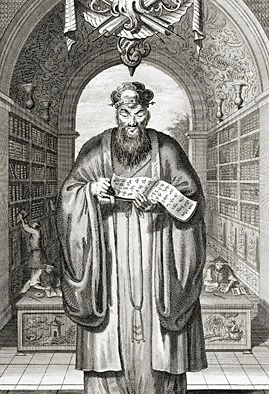Confucius
Publié le 22/02/2012

Extrait du document

Confucius (551–479 B.C.E.) Latin for the Chinese
name K'ung-fu-tzu, "Master K'ung"; a profoundly
infl uential Chinese moral teacher whose thought
gave rise to CONFUCIANISM Confucius was born in
China at a time of unrest in the middle of the Chou
period. Little is known for certain about his life,
and many details that follow are legendary.
It is said that Confucius's family had some status
but little wealth. Despite the family's poverty,
he received an education and hoped for a political
career. He served the government in some minor
posts, such as overseeing sheep and cattle. Perhaps
around the age of 40, he also began to teach. With
time Confucius rose to a position of some responsibility,
but he became disillusioned because he
was unable to infl uence the duke of Lu, his home
state. He resigned around the age of 54, and for
the next 13 years he traveled around China, looking
for a ruler who would put his ideas into practice.
He was unsuccessful, perhaps because his
teachings emphasized virtue at a time when rulers
were looking for action. About fi ve years before
his death he returned to Lu, where he taught and
may have held another offi ce. During his lifetime,
then, Confucius's infl uence was minimal. After his
death, his teachings came to exercise a profound
infl uence on the Chinese state.
Some suggest that Confucius should be seen
as a moral rather than a religious teacher. Indeed,
Confucius's teachings redirected to the living the
respect and li (RITUALS) that Chinese had traditionally
given to dead ancestors. Confucius also
made revolutionary innovations in the institution
of teaching. Before his time, education was
available only to those with the means to buy it.
Confucius taught that education should be open
to all who had interest and intellectual ability,
regardless of whether they could pay. Despite
these radical innovations, Confucius saw himself
not as an innovator but as a restorer of Chinese
traditions. In keeping with this self-image, he is
said to have edited fi ve traditional Chinese classics
(see I CHING).
As a teacher, Confucius did not aim to impart
knowledge or foster intellectual ability but to nurture
a quality of the inner person known in Chi-nese as jen. The term is diffi cult to translate but
means something like "genuine humanity." Confucius
taught that people could realize this internal
quality by means of external observances: They
could become genuinely humane by performing
their duties without thought of reward (yi) and by
observing the rules of propriety (li) that govern
relations between human beings. When applied
to specifi c roles, Confucius referred to the process
of cultivating virtue as a "rectifi cation of names,"
that is, making reality conform to the names. For
example, Confucius taught that if one is called a
parent or a child, one ought to behave like a parent
or child.
In Confucius's teaching, family relationships
are the cornerstone of society, and the respect of
children for parents is a cardinal virtue. Within
society, Confucius advocates the principle of
reciprocity: "Do not impose on others what you
yourself do not desire" (Analects 15.24). He also
teaches that the best way to govern is not with
rules and punishments but through propriety and
the moral example of the rulers.
After Confucius died, followers gathered sayings
attributed to him into a volume known as the
Analects (see ANALECTS OF CONFUCIUS). It is the major
source for Confucius's ideas. Beginning with the
Han dynasty (206 B.C.E.), Confucianism became
offi cially established in China. Civil servants were
required to pass a grueling examination in the
fi ve Confucian classics. Imperial offi cials maintained
the cult of Confucius as part of their offi cial
duties. Eventually every prefecture (a political unit
something like a county) in China—over 2,000 in
all—had its temple to Confucius. Although the
specifi c fortunes of Confucianism varied, Confucius's
teachings shaped offi cial Chinese life until
the Communist Revolution under Mao Tse-tung in
1949. It is likely that they continue to shape unoffi
cial life today.
Liens utiles
- Confucius: ENTRETIENS ou ANALECTES
- Confucius
- Extrait des entretiens de Confucius
- Confucius, Entretiens (extraits) - anthologie.
- Confucius par Etiemble Professeur à la Faculté des Lettres, Montpellier Ce qu'on sait du vrai Confucius historique se réduit à peu de choses : quelques noms, quelques dates, le lieu de sa mort ; hors cela, des anecdotes d'authenticité douteuse.








